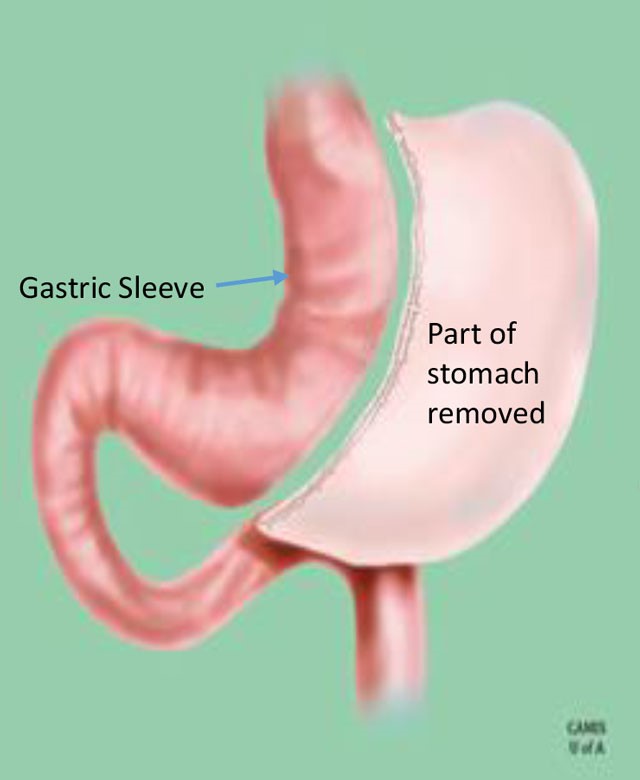How is a sleeve gastrectomy done?

A sleeve gastrectomy removes most of the stomach to make a sleeve
Image credit: Centre for Advancement of Surgical Education and Simulations (CASES)
A sleeve gastrectomy is a surgery that removes most (about 80%) of the stomach.
To do a sleeve gastrectomy, a surgeon uses surgical staples to divide the stomach into 2 parts. The long and narrow part of the stomach that stays in the body is called a sleeve. The rest of the stomach is removed from the body.
How does a sleeve gastrectomy help you lose weight?
When you eat, food passes into the sleeve from the throat and to the intestines. After the surgery, your stomach is much smaller. Because of the smaller size of your stomach, you’ll only be able to eat about 1 cup (250 mL) of food at a time. So you’ll feel full, even when you eat smaller amounts (portions).
Eating less food means you’re taking in fewer calories, which will help you lose weight.
After surgery, your body will make less ghrelin (a hormone that makes you feel hungry). When you make less ghrelin, you won’t feel as hungry.
Your body is able to absorb most nutrients from the food you eat. This is because food still passes through the lower part of the stomach to the upper part of the small intestine (where most foods are absorbed). You’ll need to take vitamins and minerals to get all the nutrients you need.
What are the risks or side effects of a sleeve gastrectomy?
The following are some of the risks and side effects of having a sleeve gastrectomy.
The surgery can’t be undone (reversed)
When you have a gastric sleeve, you won’t be able to have surgery to make your stomach full size again (have the surgery reversed). This is because most of your stomach was removed.
Some people may have another surgery to have a gastric bypass instead.
Not getting enough vitamins and minerals
You’re at risk for low levels of vitamins and minerals. This is because you’re eating less food and your body doesn’t absorb as many nutrients after surgery.
To help your body get enough vitamins and minerals after surgery:
- eat healthy meals and snacks
- take vitamin and mineral supplements each day
You should also go for regular blood tests to check your vitamin and mineral levels. This will help your healthcare provider know how many extra vitamins and minerals your body needs.
Weight gain
After surgery you will eat smaller portions. You may gain weight back if you take in extra calories by:
- choosing high calorie foods more often
- eating too much or eating too often (called grazing)
